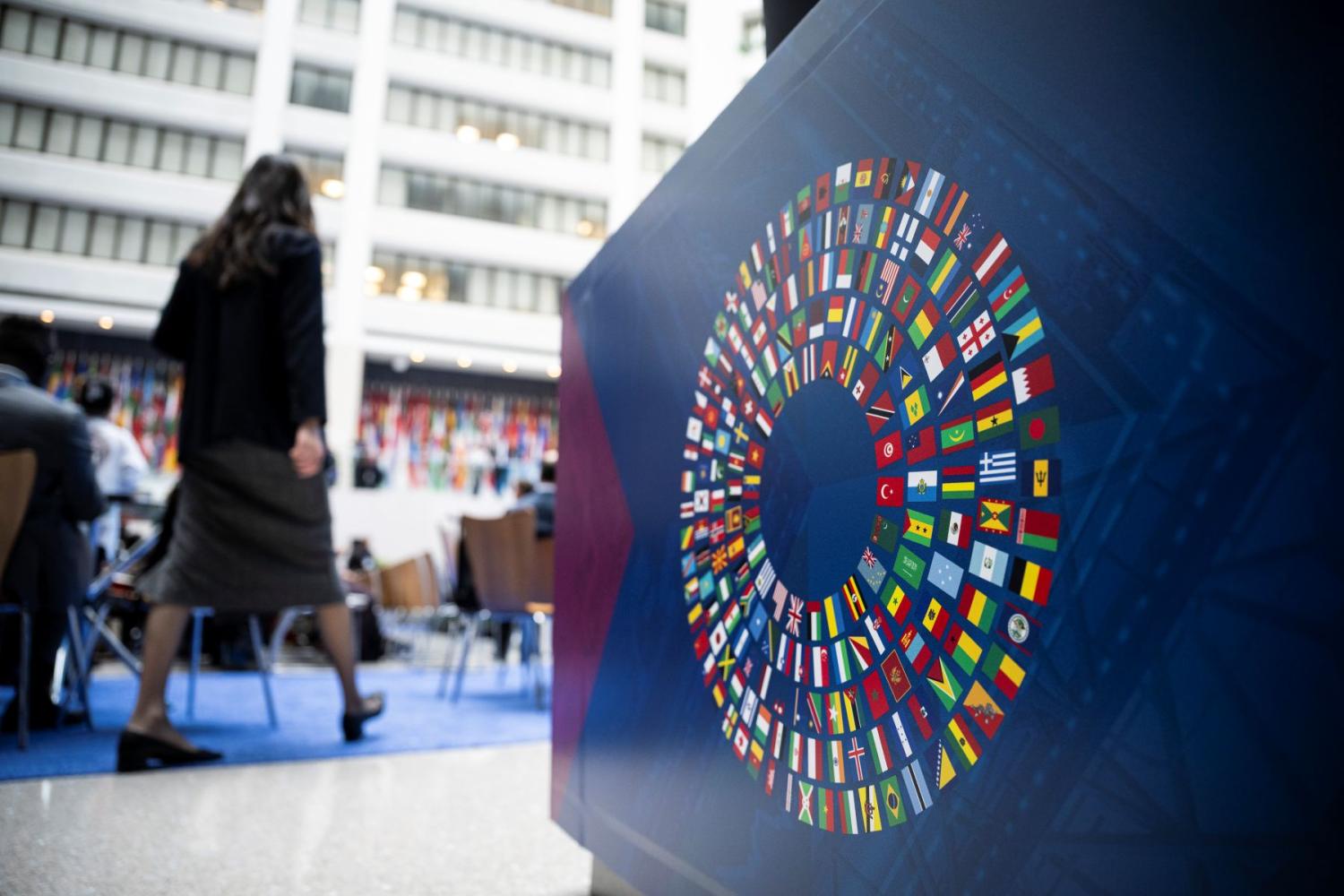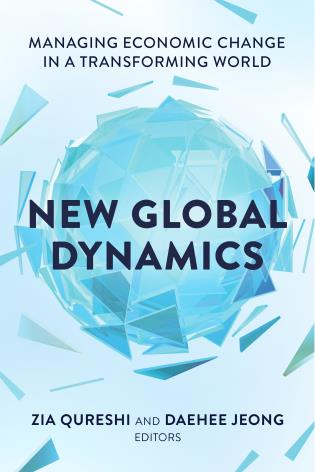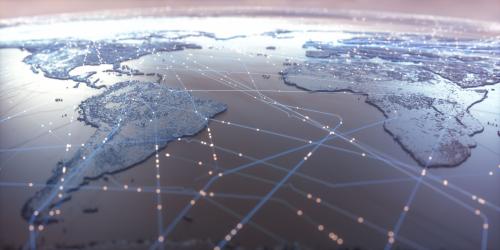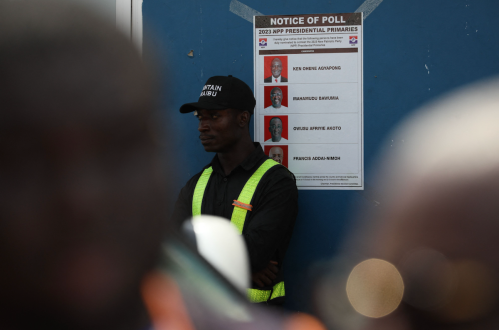In matters ranging from trade to finance to climate, the world today is more connected than ever. International cooperation is indispensable in providing a rules-based framework for global trade and finance and addressing climate change and other global challenges that transcend national borders.
Yet the multilateral system—institutions, rules, and policies underpinning cooperation among nations—is faltering. Impaired by long-standing shortcomings and a failure to keep up with the dynamism of the global economy, it now confronts a rapidly changing geopolitical and technological landscape.
The world faces a new Bretton Woods moment—a time for bold reimagination and decisive action to build a multilateral system fit for the challenges and realities of the 21st century. The postwar multilateral system, shaped by the United States, helped drive global economic progress for eight decades. It also supported and advanced U.S. interests. But it now needs a major overhaul. Escalating trade wars, intensifying geoeconomic fragmentation, and mounting associated costs underscore the urgent need for a fundamental rethink.
Rather than abandon the system as the geopolitical order shifts, it is in the U.S. interest to stay engaged and play a leadership role in reshaping it.
New challenges in a changing world
This week the world’s economic leaders gather in Washington, D.C., for the annual meetings of the International Monetary Fund (IMF) and the World Bank. These meetings take place at a time when the multilateral system for economic cooperation among nations is facing a growing existential crisis. They provide an important opportunity for collective reflection on the challenges at hand and the way forward.
Many of today’s challenges are global in nature, from disciplines governing trade and finance in an increasingly interconnected world economy to climate change. These challenges reinforce the need for international cooperation. No country, however powerful, can deliver global economic stability or climate sustainability alone. The alternative to cooperation is a much worse outcome for all—a downward spiral for the global economy and the climate. Failures to manage interconnectedness well have real consequences for people and society, from loss of jobs and social discontent to exposure to extreme weather. And no country is immune, including the United States as factory workers in the Midwest and coastal communities can attest. The COVID-19 crisis dramatically illustrated how vulnerable we all are when countries do not work together effectively. Yet the global cooperative arrangements meant to address these challenges are outdated and struggling to keep up. From the mounting trade tensions to the worsening climate crisis, there is an urgent need for reform.
Failures to manage interconnectedness well have real consequences for people and society.
The core elements of the multilateral system for economic cooperation among nations were established at the end of World War II, which followed a period that saw the Great Depression and trade wars amid widespread international economic conflict.1 The international monetary and financial conference held in Bretton Woods, New Hampshire in 1944 laid the ground for the establishment of the key multilateral institutions: the IMF; the International Bank for Reconstruction and Development (now known as the World Bank); and the General Agreement on Tariffs and Trade (GATT), which was succeeded by the World Trade Organization (WTO).2 This system, and the rules it established for international finance and trade, played a critical role in supporting global economic growth and stability—and also served the interests of the United States, which led the system’s establishment and development. But the current multilateral system now faces challenges that call for a major overhaul.
The multilateral system has not been static. It has evolved over time. As needs changed, the key institutions adapted their policies and programs, new rules and mechanisms were established, and new international bodies were set up to complement the core institutional structure, ranging from regional development banks to specialized organizations, such as those responsible for financial system oversight. These efforts helped the system adapt and stay aligned with change to some extent.
Yet pressures and stresses in the multilateral economic system have been mounting. As globalization advanced, and the scale and complexity of challenges requiring international cooperation evolved, the system’s capacity to respond increasingly fell behind—a mismatch often referred to as a widening global governance deficit. More and more, multilateral institutions were seen as unrepresentative of a changing global economy and encumbered by internal deficiencies and rigidities. Across both the global North and South, and from their differing perspectives, dissatisfaction and frustration grew. This led many countries to turn to alternative solutions and mechanisms, from bilateral arrangements to regional or like-minded blocs. Today’s trade tensions signal deep issues with the current system. Within economies, public policy failures to manage the necessary economic restructuring and address labor market and distributional impacts of globalization stoked a public backlash against international integration and the institutions associated with it. Predictably, political appetite for international cooperation dwindled.
The world is facing a unique confluence of three powerful forces of change: shifting geopolitics, technological transformation, and climate change.
The context for multilateralism is now changing much more profoundly, raising fundamental questions of whether the current system and its modalities remain fit for purpose. The world is facing a unique confluence of three powerful forces of change: shifting geopolitics, technological transformation, and climate change. Together, these forces constitute a conflux of disruption not seen in the postwar period. Each affects multilateralism in significant ways.
An epochal geopolitical transition is unfolding. The rise of China, and other new economic powers, is challenging the postwar unipolar world order led by the United States. Fueled by escalating international power rivalries, particularly between China and the United States, as well as populist politics, economic nationalism is surging. Past policy paradigms are being upended. Nationalist industrial policies and protectionism are on the rise, as are a variety of discriminatory actions against geopolitical rivals, even in economies that had been the champions of a neoliberal philosophy of free markets and openness. Economic statecraft increasingly trumps economics in policymaking, and geopolitical power plays are supplanting rules-based frameworks for international engagement. The United States, the architect of the multilateral system for economic cooperation, is revisiting its commitment to it. These geopolitical shifts create serious risks of geoeconomic and geofinancial fragmentation and fracture of global economic governance—to the detriment of all. They shake the very ground under the current edifice of multilateralism.
The digital revolution and artificial intelligence (AI) are transforming markets, within economies and internationally. They are reshaping trade and finance. Digital trade and digitally deliverable services are the new frontier of international commerce, posing new challenges for a world trading system built mainly around physical goods. New financial products and mechanisms—from fintech to cryptofinance—have major implications for the international financial and monetary system and regulatory arrangements. The powerful new technologies hold enormous promise but also carry serious risks that require governance frameworks for international coordination, even as major-power rivalry for technological supremacy intensifies. The multilateral system not only faces geopolitical disruption of existing international rules but must also devise new rules and cooperative arrangements for this technological era.
Climate change confronts humanity with a huge restructuring challenge. It has catapulted the provision of global public goods to the forefront of the international agenda. The COVID-19 pandemic also spotlighted the role of global collective action on shared challenges that cut across national borders. The current multilateral development architecture was structured largely around country-level engagements. The challenges of global commons were not a major part of its initial design, but they must now become central to the mission. From trade to finance, there is a need to align frameworks with climate policy.
Paradoxically, just as the world seems to be turning away from multilateralism, it needs more, not less, cooperation to address shared challenges. This paradox exists because the multilateral system as it now stands needs a major reset to fulfill its role in today’s world.
We are at a moment in history that calls for a bold reimagination of multilateralism.
We are at a moment in history that calls for a bold reimagination of multilateralism. It is a new world, both in terms of the geopolitical order and the needs and imperatives for international cooperation. The time for half-measures and incremental fixes has passed. The new world calls for a new multilateralism. Echoing the founding of the postwar system, a new Bretton Woods moment would be an apt characterization of the current juncture—a time to ask: If we were designing a multilateral system from scratch today, with our current knowledge, what would it look like?3
Such a fundamental rethink and redesign may seem daunting when multilateralism is in crisis and faces challenging geopolitics. But in a crisis, there is often also an opportunity. As the adage goes, a crisis is a terrible thing to waste.
Rethinking and redesigning multilateralism
Most efforts to reform the multilateral system have taken a piecemeal, incremental approach, focusing on narrow adjustments rather than questioning the fundamental rationale of the existing institutions and their functions. But this moment calls for reimagining multilateralism from the ground up, starting with the challenges multilateralism should focus on in today’s world and assessing the institutional architecture and policies that would best address those challenges in the context of contemporary realities on the ground. The effort should not be confined to fixes to the legacy system. It should not stop at recommending reforms to existing institutions, but it should also ask which ones may have outlived their usefulness and should be retired, what new institutional forms are necessary, and what new policy frameworks need to be put in place. It must go deeper and examine what the system should be like in our transforming world with its new challenges and geopolitical dynamics.
Reform of individual parts of the multilateral system that address specific challenges must be informed by an overarching, new vision for multilateralism. We must first ask what the key challenges are that require multilateral solutions, and how cooperative frameworks need to be rethought in today’s changing economic and political landscape. This framing would identify pivotal, cross-cutting themes that reveal how the focus and structure of multilateralism must evolve. Among the questions that must be addressed are:
- What problems require multilateral cooperation? Visions of economic multilateralism today range from the expansive to the minimalist. Should multilateralism have a sharper, narrower focus on challenges that absolutely require global collective action, such as global public goods and core disciplines against beggar-thy-neighbor policies—climate protection, global public health, financial stability, essential rules for international trade and finance, and AI safety?
- In what ways do today’s big forces of change affect multilateralism and necessitate a fundamental rethink? What are the different scenarios to consider? What, in particular, are the implications of the geopolitical dynamics and the U.S.-China rivalry? Why is it important that the United States stays engaged and leads the system’s renewal? What are the implications if it disengages?
- What does a refocused multilateralism imply for its institutional structure—the role of global versus various sub-global institutions and frameworks? What institutions will be necessary and with what mandates? Are plurilateral arrangements a complement or a threat to the multilateral system? In the years ahead, the world is likely to see more diverse institutional arrangements, especially as geopolitics drives a reconfiguration around competing power centers. How can such variable institutional geometry be best designed and managed to ensure that the world has the necessary collective ability to meet common future challenges?
- In the area of international trade, for example, one key issue is whether the WTO can regain its role of anchoring a rules-based multilateral trade order. If not, what other institutional frameworks may be needed? Will plurilateral arrangements and coalitions of the willing fill the void?
- A multipolar world, with more assertive nationalism and shifting policy paradigms, will be characterized by greater heterogeneity of preferences and policy approaches among nations. International cooperation may be driven more by shared interests than shared values. Does this imply the need for multilateral frameworks that, while anchored in agreed core principles, are more flexible and allow wider leeway to national policies? Relatedly, in what ways can legitimate national security interests be better balanced with economic openness?
- What are the risks to global financial stability from geopolitically-driven fragmentation of the international financial system? How will global responses to global shocks be ensured?
- How should the international architecture for financing global public goods, such as combating climate change, be designed? Can existing multilateral development banks be repurposed to focus on the provision of global public goods or are new institutions needed?
- With limited public resources and booming private finance, what innovations are needed to modernize funding models to meet global challenges and mobilize private finance at scale, including co-opting private actors in hybrid governance models?
- How should governance of the institutions of multilateralism be redefined to make them more representative of today’s world and strengthen their legitimacy?
Answers to these questions should define the broad contours of the reform agenda. The priorities for a new multilateral order and the principles shaping the organization of international collective action should flow from this vision. The concrete agenda for action should then be developed for each of the global challenges that ought to be the focus of multilateral cooperation today.
The US must lead
The United States shaped the postwar rules-based multilateral system. The system helped drive global economic growth and stability. The United States itself was a big beneficiary—arguably the biggest. Its producers and consumers benefited greatly from the opening of foreign markets and expanding trade, with gains ranging from rising exports to expanding trade-related investment to cheaper imports. The rules-based multilateral system not only boosted the U.S. real economy and its place as the dominant global economic powerhouse, but it also underpinned the central role of the U.S. financial system in global finance and the role of the U.S. dollar as the world’s dominant currency and reserve asset. The U.S. leadership of the multilateral order and its institutions gave it considerable influence over global economic decision-making and rule-setting. The economic and financial strength of the United States in turn was an important foundation of its geopolitical dominance. If the multilateral order unravels, everyone will end up worse off, not least the United States.
If the multilateral order unravels, everyone will end up worse off, not least the United States.
The multilateral system has been far from perfect of course, and the United States has had its share of related challenges and consequences. This includes the problem of countries not playing by the rules, and weaknesses and gaps in the rules that translated into a failure to ensure a level playing field among countries. But these problems call for reform of the system, not its abandonment. Behind-the-border anti-competitive practices have been a major cause of trade tensions. It is an area where the WTO has been unable to make much headway. Addressing issues related to competition policy as it affects trade must be part of the reform agenda.4
The United States, as the chief architect and de facto guarantor of the postwar multilateral system, appears to have grown weary of its global leadership burdens amid domestic challenges, such as the surging public debt. An active engagement of the United States in the reform of the multilateral system would ensure that issues of burden-sharing will be addressed as well.
As argued above, the multilateral system today is in need of a major overhaul. Rather than disengage, it is in the U.S. interest to lead in reshaping it. As the geopolitical order shifts, the multilateral system will evolve, either by design or default. For the United States, it is crucial to be proactive and steer the overhaul. Leaving a void and letting the chips fall where they may would be the wrong strategy. It would mean walking away from a winning position, to the detriment of both the United States and the rest of the world.
National interest and international cooperation need not be mutually exclusive.
National interest and international cooperation need not be mutually exclusive. Especially these days when there is so much nationalistic, myopic thinking about how to run international economic policy and engage with the world, it is important to remember the words of U.S. Treasury Secretary Henry Morgenthau in his chairman’s closing address at the Bretton Woods conference: “The wisest and most effective way to protect our national interests is through international cooperation.” Such lessons drawn from the global economic trauma of the interwar period inspired a succession of U.S. presidents, both democrat and republican, to take the lead in building the current architecture of multilateral cooperation—starting with Franklin D. Roosevelt and the establishment of the Bretton Woods institutions and the United Nations in 1944-45 and continuing with Ronald Reagan, George H. W. Bush, and William J. Clinton and the Uruguay Round trade negotiations that culminated in the establishment of the WTO in 1995.
The meetings of the Bretton Woods institutions this week would be a good starting point for a frank and in-depth dialogue to rebuild the multilateral system for the 21st century. The forthcoming U.S. presidency of the G20 provides an important opportunity to take the reform process forward in a systematic way.
-
Footnotes
- Multilateralism in international relations refers to collective action among nations to address global challenges. It covers many domains of international cooperation, from economic matters to peace and security. The focus here is on economic multilateralism.
- The regime of fixed exchange rates established at the Bretton Woods conference gave way to floating exchange rates in the early 1970s, but this institutional framework endured and has been, in the decades since, the anchor of multilateral economic cooperation.
- We are using the term “a new Bretton Woods moment” as a metaphor for a time for foundational change in the multilateral economic system, not to draw direct parallels between the situation in 1944 and now.
- While this article focuses on the change agenda in the international economic system, there is a vital complement to this agenda at the national level. Effective domestic economic management—including strengthening national finances, improving competitiveness, building new capacities in the workforce, providing adequate social safety nets, and addressing impacts that increase inequality—is essential to successful international economic engagement and sustaining public support behind it.
The Brookings Institution is committed to quality, independence, and impact.
We are supported by a diverse array of funders. In line with our values and policies, each Brookings publication represents the sole views of its author(s).








